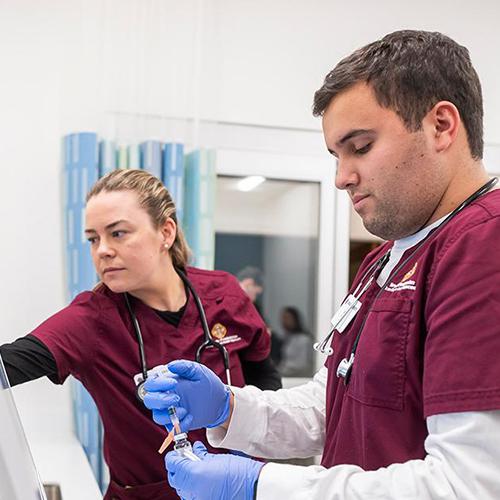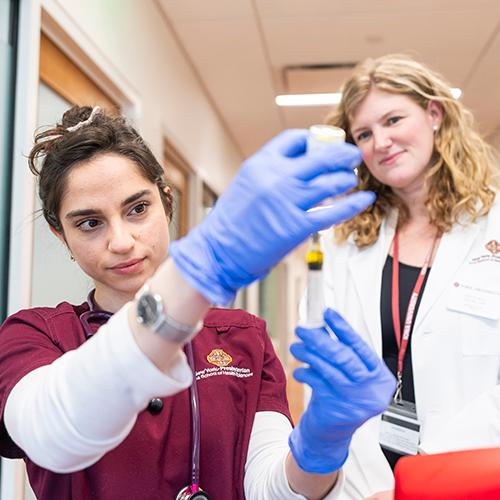Why Work in Healthcare?
Are you searching for a career field that offers a fast-paced work environment with the opportunity to make a tangible difference in the lives of those around you? Then, working in health services may be the right next step for your professional growth.
As you begin exploring whether or not you want to become a health professional, it’s essential to consider several factors. The healthcare industry is expansive, highly specialized, and ever-changing. This means no two career paths within the health services field are identical. In fact, because most roles vary so greatly, they can result in vastly different earning potentials, employment outlooks, education requirements, and opportunities for advancement. Other aspects can also impact your professional growth and compensation, such as state of employment, years of experience, and market saturation.
However, no matter what position you choose to pursue, deciding to work in the healthcare field is a commitment to serve the needs of your community, operate with compassion and promote human well-being.
Keep reading to learn about why a healthcare career may be the right choice for you and actionable steps you can take to kick-start your professional future.
Reasons to Work in the Healthcare Industry
Steady Employment Outlook
Because of the ever-growing demand for quality, patient-centered care, the health industry has a steady demand for well-trained, competent workers dedicated to serving the needs of their community.
The U.S. Bureau of Labor Statistics projects 1.8 million healthcare jobs to open annually through 2032. Furthermore, the median annual wage for healthcare workers exceeds the national average for all occupations. Practitioners and technical roles in the health industry earn a median yearly salary of $77,760, significantly higher than the annual salary of $46,310 for all occupations.
While employment projections vary by subfields within the medical industry and even regional location, pursuing a healthcare career ensures steady employment and a dependable earning potential that can help build a comfortable life.
Continual Learning and Skills Acquisition
Characterized by constant innovation and growth, the healthcare industry requires its workers to stay up-to-date with ever-changing technology, research, treatment modalities and other breakthroughs. Depending on your role in the healthcare sector and its requirements, you may need to stay up-to-date by taking continuing education credits, obtaining advanced degrees or specialized certifications and licensures or undergoing professional development courses through your employer.
Through your commitment to continual learning and skill development, you equip yourself with the skills and expertise needed to advance your career and better serve your patients and community.
Make Impactful Contributions to Individuals and Communities
Every healthcare professional, from speech-language pathologists to nurses to social workers, plays an integral role in promoting the health and well-being of individuals and communities.
As a healthcare practitioner, you advocate for patients and health equity, provide innovative solutions to complex health challenges, address disparities in access to health services and much more. You can enact meaningful, life-changing improvements in your community through your daily work and dedication to caring for people from all backgrounds.
Choose From a Range of Diverse Career Paths
While many consider doctors and nurses to be the lifeblood of the healthcare industry, because of the complex needs of human health, there is a broad range of other professional paths you can explore, including:
- Athletic trainer
- Audiologist
- Dentist
- Dietitian
- Family and marriage therapist
- Health information technologist
- Laboratory technician
- Mental health counselor
- Occupational therapist
- Pharmacist
- Physical therapist
- Physician assistant
- Registered nurse
- Respiratory therapist
- Social worker
- Speech-language pathologist
You can take on a position that involves working directly with patients, overseeing their care and advocating for their needs. Or, if you prefer to work behind the scenes, you can pursue a career in medical research, healthcare administration or health information technology.
Whatever your professional inclinations, the health sciences field has career opportunities that allow you to promote health and well-being while also matching your interests and skills.
How to Get a Job in Healthcare
While there are many routes to landing a job in the healthcare industry, we’ve outlined some helpful, actionable steps to help you progress toward your professional goals, whatever they may be.
1: Define Your Career Goals
Before embarking on your job search or committing to a degree program, it’s essential to reflect on what you hope to accomplish in your career. Since the healthcare field contains many sectors, exploring all the professional possibilities may take some time.
In addition to charting suitable career paths for yourself, assess your skills, interests, previous experience and personal goals and see how they align with your professional aspirations. By thoroughly defining all you want to accomplish and ensuring you understand the efforts you have to put in to fulfill your goal, you position yourself for success during your professional development and as you enter the healthcare workforce.
2: Pursue the Necessary Degree and Training
Because individuals and communities depend on the therapeutic fields for their health and well-being, working in healthcare often requires you to meet particular education requirements and obtain licensure so you have the appropriate credentials to care for patients or clients.
Degree, training and licensure requirements heavily depend on the sector or position you are pursuing. But, typically, as a healthcare worker, you must have a robust science-based background with a firm grasp of biology, anatomy, physiology and chemistry. Additionally, it’s important for you to understand how to utilize technology, implement culturally competent practices, rely on strong communication skills and much more.
Advanced roles in the health services field—occupational therapists, mental health counselors, speech-language pathologists and others—require you to pursue a graduate degree after earning your bachelor’s degree. If you want to pursue a career in the medical field and want to know what courses will help you prepare, we recommend connecting with pre-health advising experts to help set you up for success in your graduate education and professional endeavors.
Whether completing a bachelor's in nursing, earning your social work degree or obtaining specialized certificate in healthcare management, be sure to research your desired career path's academic and professional requirements and pursue relevant degrees, certifications or licensures accordingly. Making these critical investments in your education helps you secure employment in healthcare.
3: Build Your Skill Set Through Hands-on Internships and Clinical Rotations
While classroom learning builds a solid theoretical foundation, gaining hands-on experience through internships and clinical rotations puts your knowledge into practice, sharpens your skill set and distinguishes you as a competitive candidate in the workforce.
Degree and licensure programs typically require internships or clinical placements; however, seeking extracurricular internship opportunities, volunteer roles or rotations in healthcare clinics, hospitals or research facilities allows you to immerse yourself in real-world healthcare settings, diversify your experience and forge connections with other health professionals.
4: Tailor Your Résumé and Cover Letter
As you achieve academic success, acquire new clinical skills and gain meaningful work experience, your résumé and cover letter are exceptionally important to find an entry into healthcare employment opportunities.
For each position to which you apply, tailor your application materials to highlight unique aspects of your education and experience and demonstrate how your skill set and background align with the specific requirements and mission of the healthcare organization. By customizing your résumé and cover letter for potential employers, you emphasize your versatility and show an understanding of how you can adapt your skills and experience to meet the job qualifications and needs of the employer.
5: Grow Your Professional Network
Like any industry, collaborative relationships form the foundation of the healthcare field; cultivating thriving professional relationships with your fellow healthcare workers expedites career growth and results in exciting opportunities.
Start building your personal network early on by getting involved in student organizations, pursuing faculty mentorship and participating in volunteer opportunities. Then, as you emerge into the workforce, attend industry conferences, seminars and networking events to connect with new mentors, field experts and potential employers.
When you foster connections with industry veterans, peers and up-and-coming professionals, you create a tight-knit professional community, deepen your career insights and help support the career trajectory of those around you.
Make your mark on the healthcare field by enrolling in the NewYork-Presbyterian Iona School of Health Sciences, located on Iona University’s Bronxville campus.
Through our partnership with NewYork-Presbyterian, ranked among the best hospitals in the nation by U.S. News & World Report, we offer four bachelor’s degree programs and six graduate programs that deliver a top-quality education and transformative opportunities to participate in leading-edge research initiatives and hands-on clinical care.
If you want to pursue a versatile undergraduate degree program, Iona’s Bachelor of Science (BS) in Health and Wellness program provides a starting place to build an academic foundation supporting your growth in various healthcare careers. With five distinct concentration tracks, you can tailor your degree to suit your professional interests and strengthen your skills.
Is a Healthcare Career Right for You?
If you are looking for a rewarding career that can make an impact on society, you should consider breaking into the healthcare field. Begin your journey to becoming a healthcare leader at Iona University! Request information to learn more about how the NewYork-Presbyterian Iona School of Health Sciences can help you reach your goals.






